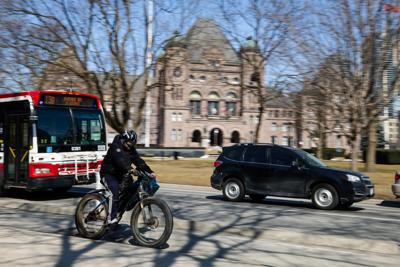Premier Doug Ford’s government appears willing to compromise on its controversial plan to tear out ╬┌č╗┤½├Į bike lanes, with talks underway that could allow some to remain as long as car lanes can be restored.┬Ā
“We were re-elected with a clear mandate to address (traffic congestion) challenges by removing bike lanes brought in at the expense of a car lane,” said Dakota Brasier, director of media relations for Transportation Minister Prabmeet Sarkaria.
“Where both a reinstated car lane and a bike lane can exist, we are open to collaboration with the city of ╬┌č╗┤½├Į, provided they fund their portion of their identified infrastructure needs,” she said.
Mayor Olivia Chow said Wednesday that there has been no breakthrough in discussions with the province, but that from ŌĆ£day oneŌĆØ sheŌĆÖs been advocating for a ŌĆ£win-win solution.ŌĆØ
She said she’s been urging the two levels of government to ŌĆ£just get out the mapŌĆØ and find sections where it would be possible to preserve bike lanes while adding back a lane of car traffic.
ŌĆ£There are areas that we may be able to do so, so the conversation is ongoing,ŌĆØ she said at a press conference at city hall on ╬┌č╗┤½├Į’s congestion management plan.
The mayor declined to reveal which segments are under discussion, but said she is “firm” on not removing long-established bike lanes like those on Bloor Street West in the downtown Annex neighbourhood.
She said local businesses and residents support those bike lanes, which were installed in 2016, ŌĆ£so there’s no reason to rip up the road and cause more congestion and waste a lot more money.ŌĆØ
But she acknowledged there are newer cycling routes ŌĆ£that we might be able to improve on,ŌĆØ and ŌĆ£thatŌĆÖs what weŌĆÖre looking at.ŌĆØ
Chow’s office didn’t directly respond to a question about whether she would agree to the province’s condition that the city pay for any bike infrastructure it wants maintained as part of a compromise with the province. In a statement, her press secretary Zeus Eden pointed out that council has adopted the position that the city shouldn’t be on the hook for any costs associated with Ontario’s bike lane legislation.┬Ā
Ford’s government┬Āpassed a law last November┬Ārestricting the installation of new bike lanes and empowering Queen’s Park to remove existing ones on┬ĀBloor Street, Yonge Street and University Avenue. The province was scheduled to start ripping out lanes as early as March 20, but the work has yet to start.┬Ā
It is estimated that┬Āabout three per cent of ╬┌č╗┤½├Į residents┬Āride to work ŌĆö although cycling rates are higher in downtown areas where the bike lane network is concentrated ŌĆö and polling suggested a majority of Ontarians┬Āapproved of the move┬Āto limit bike lanes if traffic was impacted.
The Ford governmentŌĆÖs own research, released as part of an ongoing court challenge, showed that removing the bike lanes would have a minimal or negative impact on ╬┌č╗┤½├ĮŌĆÖs congestion and may make the roads less safe.
On Wednesday, Barbara Gray, the city’s general manager of transportation services, told the Star that reintroducing a lane of traffic while keeping the bike lanes is possible on all of the main thoroughfares where the Ford government has pushed to remove bikeways, but it’s “not a short process.”
“It’s something that requires us to take a look at each of those segments and we continue to work on that,” Gray added.
Although neither the province nor the city would publicly discuss specific roadways that might be revamped as part of a compromise, a portion of University Avenue is currently under construction, and could be easier to reconfigure than other streets.
Two sources confirmed that one proposal that has been discussed by the two governments would restore two car lanes on University near hospital row, narrow the street’s bike lanes, and eliminate on-street parking. One of the sources stressed that discussions about the plan, which was first reported by the Canadian Press, were informal. The Star granted the sources anonymity to speak about plans that have not been finalized.┬Ā
Michael Longfield, executive director of Cycle╬┌č╗┤½├Į, said a potential compromise won’t impact his organization’s Charter challenge against the province’s move to take out bike lanes on major ╬┌č╗┤½├Į arterials. A court is scheduled to consider the group’s filing next Wednesday.
“Ultimately we’re hoping that the legal challenge itself makes all of this moot,” Longfield said. “We think the case itself is really strong and it’s underpinned by the idea that the removal of these bikeways is arbitrary and doesn’t meet the province’s goal of reducing congestion.”
Last month┬Āthe Superior Court denied Cycle╬┌č╗┤½├Į’s request for a temporary injunction┬Āagainst the removals.┬Ā
In a separate case, a group of Etobicoke business owners has filed a lawsuit against the city, its transportation manager, and the local city councillor over the westernmost section of the bike lanes on Bloor. They allege the municipality was negligent in installing the lanes, which they say have caused congestion and hurt local business. The allegations haven’t been proven in court.




























To join the conversation set a first and last name in your user profile.
Sign in or register for free to join the Conversation